The Most Important Question in Magic
Let's say you're in between where you were and where you want to be. You know the basics: You can start to build your own deck. You can navigate a game just fine. You win some and you lose some.
But you want to improve. It's not enough to just play Magic—you want to be better. Perhaps you smell some savory dream just on the other side of the wall, like qualifying for the Pro Tour...or maybe just finally taking down Jimmy in one of your local Draft pods.
How do you get there? How can you find the seemingly invisible handholds that will help you scale to your plateaus?
Welcome to Beyond the Basics.
Each week, I'm going to be taking an in-depth look at some aspect of Magic. It could be how to build a specific kind of deck. It could be how to read signals in Booster Draft. It could even be analyzing specific plays that readers send my way.
After a couple months off from my ReConstructed weekly column, I'm thrilled to be back in the column saddle. I have a long list of topics I can't wait to cover! (And if you have a topic you'd love to see looked at, please let me know—more details on that later.)
And this week, I'm going to kick it off with a one very simple question. What I like to think of as the most important question you can ask yourself while playing a game of Magic.
Are you ready?
Here it is:
Why did my opponent do that?
Information about Information
Imagine you're sitting down to play a game of Magic. You shuffle up. You start playing lands and casting spells. Or, in short, you begin to make plays.
Now, these plays you're making—they're not random chance. Every decision you make has a reason behind it. Now, regardless of if that reason is correct or not, there's a reason you did it.
Consider going to the grocery store. You don't just grab an item every five feet and toss it haphazardly into your cart. (Well, unless you're on Supermarket Sweep.) No: everything you put in your cart has a purpose. You buy bread because you want it for sandwiches. You buy eggs because you intend to bake a cake sometime before those eggs go bad. And, if you're me, you buy three containers of hummus to ensure you don't accidentally run out.
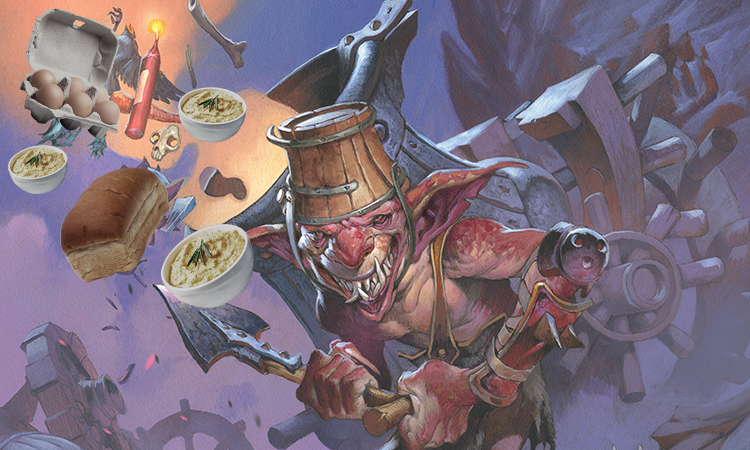
Those are all decisions with intent—and to your intent, it doesn't matter at this moment if you actually do end up baking a cake with those eggs, or if you really need that third container of hummus, because at the time you definitely believed you did.
Let's stop making ourselves hungry and go back to Magic.
As a player, you can assume everything your opponent does—every single thing—has a reason behind it.
And the only thing standing between you and becoming a telepathic Magic player? Unraveling all of that juicy reasoning that your opponent is just leaving a trail of breadcrumbs for you to find. (Okay, maybe I wasn't done with the food metaphors quite yet.)
If you ask yourself, "Why did my opponent do that?" after every play, it will change the way you look at the game.
Let me show you what I mean.
A Land of Information
You're playing a match of Standard against Mark. Let's say it happens to be against the Black-Green Aristocrats deck from the last Pro Tour.
It's Game 2, and he's on the play. On his first turn, Mark plays Westvale Abbey and passes.
Now, there are two options here:
- Draw your card and take your turn. I mean, all they did was just play a land.
- First, ask yourself the question: "Why did my opponent do that?"
The first is just how the game would often proceed. But imagine, for a moment, we ask ourselves the question and walk down the second path.
What does Mark playing a Westvale Abbey mean?
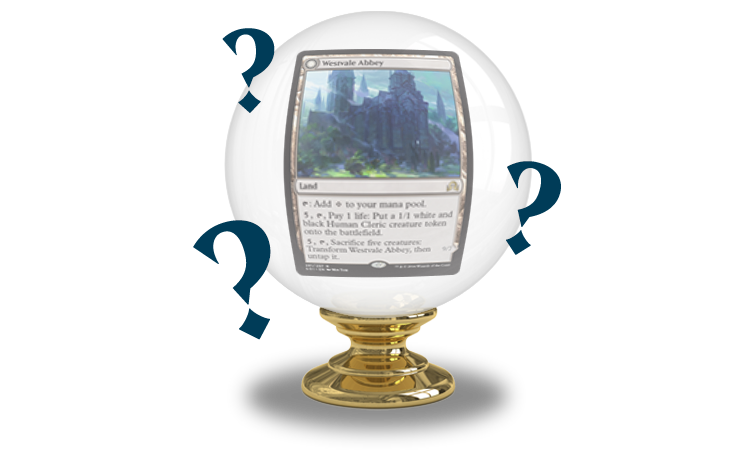
Why would Mark lead with Westvale Abbey?
Mark's deck is black and green. The source of colorless mana isn't doing anything for him. If he had Hissing Quagmire, he would have played it tapped here—so his hand clearly doesn't have Hissing Quagmire. If he had plenty of colored mana, he probably would have led with one of those.
Drilling down a level further, if you know the deck's strategy, you know that it is often beneficial to wait to reveal your Westvale Abbey until as late as possible.
What does this all mean? Well, most likely, it means that Mark is light on colored mana. Maybe he kept a hand with two Westvale Abbeys. Maybe he has a bunch of one-drops and a Cryptolith Rite in his hand and is hoping to get there by plucking a colored source. You don't know that part yet—but it's definitely safe to assume that Mark is low on lands.
What does that mean for you? Well, depending on your deck, it means you might start playing more aggressively because of his land-light situation—or, if your deck beats his in the long game, you can lean toward the stronger play that might take extra time to set up.
When Information Attacks
It's combat time!
You're playing Shadows over Innistrad Limited against Jimmy and are in the late game. You're each at 12 life, and he is playing blue-red. You each have plenty of mana. The only creature on the board is Jimmy's Mad Prophet. He draws a card into his otherwise empty hand and passes.
Let's ask ourselves our fundamental question here: What does that mean?
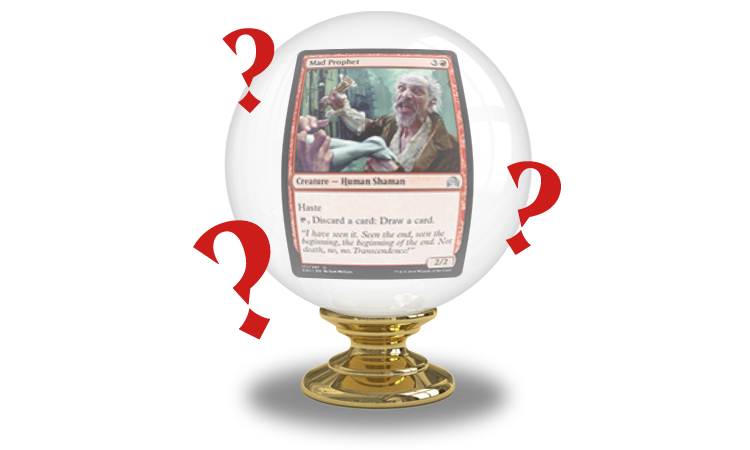
Well, let's run through it.
If Jimmy drew a land, he would almost certainly pitch it away to the Prophet immediately. You have no board presence, and he doesn't really need to keep his creature up to block. Finding another threat is important.
But, on the other hand, if Jimmy drew a card he absolutely wanted to keep, then he would have attacked with the Prophet! No reason to not get in the 2 damage. If it was a creature then he would just play it postcombat.
So what this sequence tells you is very interesting: he drew a card that he wants to keep, but he also wants to leave the Prophet untapped.
This could mean a couple things. Maybe he drew a mediocre spell and wants to make sure he doesn't need it on your turn before pitching it away. But more likely than anything?
Madness!
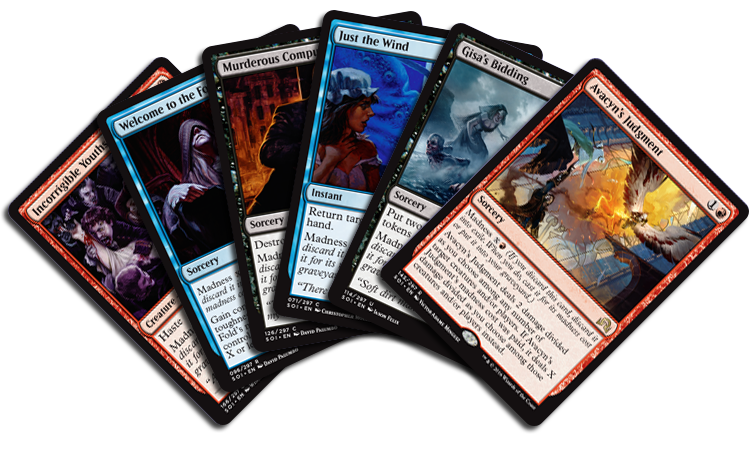
You can cast anything with madness at instant speed when you discard it. This play makes by far the most sense if he drew a madness card, so it's reasonable to conclude that is what your opponent has.
Why does this matter to you? Well, it could be relevant for a number of reasons. For example, if your opponent doesn't use the Prophet on your turn, I would immediately put them on having a reactive madness card like Broken Concentration—and a few turns down the road, knowing that their last card is a reactive madness card could be the difference between winning and losing.
Time Is Information
A huge indicator of what your opponent has in his or her hand is when they cast their cards. As a good general rule of thumb: if your opponent is doing something out of the ordinary, you should be asking yourself why they're doing it.
Here's a good example.
Once again, back to Shadows over Innistrad Limited. Your opponent, Kimberly, has been playing well all match, and is playing green-white. She untaps, plays a Thraben Inspector, and attacks you with her creatures.
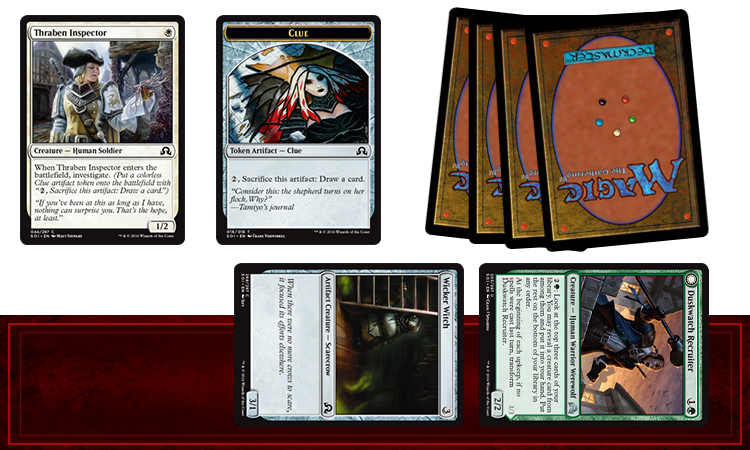
What does this attack mean?
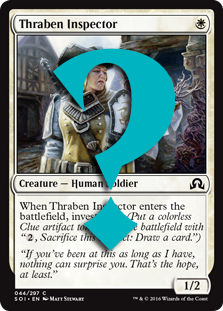
If the gigantic Thraben Inspector with a question mark above didn't Clue you in (har har), here's the weird thing: Kimberly cast Thraben Inspector precombat. Normally in Magic, it is strategically correct to wait as long as possible to cast your spells—so creatures are often cast in the second main phase. The break from the norm here is that she cast it before attacking.
Why would that be?
Well, it added two things to the board: an additional Human and a Clue token. The most likely thing is that she wanted one of these two to be on the board. One possibility is that, if things go poorly in combat, she hopes to crack the Clue token and find a response.
But, very likely, there's a card she has that is telling her to alter her play style and cast the Inspector early.
So, to go a level further and identify the card she's most likely to have: Confront the Unknown.
This would be a pump spell you would want to hit for maximum value when you're attacking. And knowing this could be the difference between winning and losing.
Maybe you're sitting at just 7 life, and if you let the above attack through, you'll end up losing. Maybe you are going to block, and if you block the Recruiter with your 3/3 you're going to get blown out, while blocking the Wicker Witch is safe. (Plus, going one level deeper, Duskwatch Recruiter is so powerful that they're unlikely to make an attack that would let it trade off it here.) Maybe it means you shouldn't block at all. But knowing that piece of information is crucial.
Misinformation
After laying out all of these principles, there's usually a common immediate follow-up question: "What if it wasn't intentional and my opponent just made a mistake?"
And it's totally reasonable to wonder that. After all, people make mistakes when playing Magic all the time. Even veterans of the game who have played at the highest level of the game make errors. Someone could easily just accidentally pass without attacking with their Mad Prophet and not have a madness card in their hand at all!
And that's totally reasonable, and does happen. But, realistically, most of the time your opponent is not trying to make mistakes. You should almost always make the base assumption that your opponent is playing well. Sure, there are some rare cases where you have other information that makes you deviate—for example, your opponent passes with Mad Prophet and slams their hand to their face, saying "oops!"—but in general you should not underestimate your opponent.
With that said, everything should be taken in moderation and with best judgment. This extra information—like all other information in Magic—should be evaluated in context. If you're using it to make a play that is only five percent better than the next-best play if you read them right, but disastrous if you read them wrong, it might not be worth it. It's one more thing to keep in your mind and find useful.
Then, of course, there's a level deeper.
There is a level of play where people will try to outthink you. Where they will play their Thraben Inspectors before combat to make you wonder if they have Confront the Unknown and see if you block assuming they have it.
That's always a possibility. But to be realistic, only the game's seasoned veterans are going to be operating at that kind of level. It's something you should be aware of—but not something I would play around most of the time, especially as you're just beginning to ask yourself "why" all the time.
Out of Information
And that covers an introduction to the most important question in Magic.
I'll end with one of my favorite Magic stories, illustrating how this kind of thing can play out at the highest level. It uses a few weird older cards—but the core holds up to this day.
It was years ago, during Time Spiral block Constructed. Hall of Famer Luis Scott-Vargas and Paul "Paul" Cheon were playing a control mirror match.

This deck, built around Mystical Teachings, featured tons of reactive spells and ways to counter each other's plays.
One of the key cards in this matchup was Ancestral Vision.
The burst of cards you would pick up off Ancestral Vision was often enough to end the game on its own. Paul had Vision suspended with just one time counter left. It was about to come off of suspend.
Paul was completely tapped out and his opponent, Luis, said go. He stopped Paul in his upkeep, though, and cast Pull from Eternity on Ancestral Vision—essentially destroying it.
This was bad for Paul: he wanted that Ancestral Vision to resolve! Fortunately for him, he was holding a counterspell.
The instinct here is to counter it immediately. It's a crucial part of the matchup! In my mind's eye, when I think of this story, I imagine Paul reaching for the counterspell in his hand, flicking it in between his fingers to cast—and then stopping.
Because Paul realized something slightly odd was afoot. He was completely tapped out last turn, and Luis could have just cast the Pull without any fear of having it countered. The logical conclusion? Luis wants Paul to cast Cancel on his Pull.
Paul let the Pull resolve. And, indeed, the card in Luis's hand? Imp's Mischief.
This tech card would have redirected the Vision to Luis, likely clinching the game—and he just had to bait out Paul's counterspell first. Wisely, Paul let the Pull stick.
And that, ladies and gentlemen, is how to apply the question "why?" to a situation.
Hopefully you found this useful to kick things off! There is a lot more I'll be talking about in the weeks, months, and years to come.
And speaking of that, I'd love to know what you want to see covered! Please get in contact me and let me know what topics you'd like to see covered or are curious about. Do you have an interesting play to talk about? A kind of deck you can never seem to build quite right? A constant problem with finding your colors in Draft? I want to know what you think I should cover next!
The best places to reach me? As a lover of social media, anywhere you follow me is a great place to do it—perhaps best of all is Twitter and Tumblr. I read through everything I'm sent on there. And while I prefer social media, if you're not on quite up for that, you can also email me at beyondbasicsmagic@gmail.com in a pinch and I'll be sure to check it out.
May you go beyond the basics in the next week, and always ask the question "why?"
Talk with you all next week! I already can't wait.
Gavin

